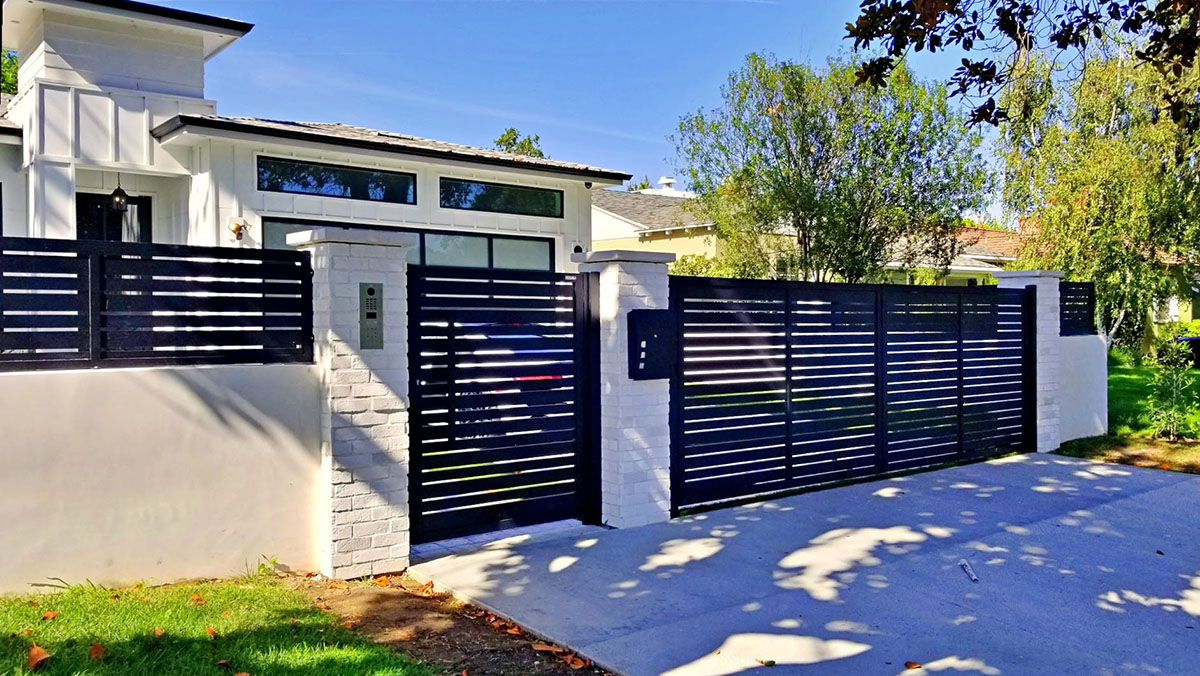All Categories
Featured
If you're considering setting up a fencing around your residential or commercial property, comprehending the authorization demands in your area is vital. In this guide, we'll damage down the different authorizations you may require to mount a fencing and just how to guarantee your project stays compliant with regional regulations.
Why Are Allows Needed for Fencing Installment? Permits are needed to make sure that the fence you develop adheres to regional structure codes, zoning policies, and safety standards. They make certain that the fencing will not block utilities, traffic flow, or create risks for pedestrians.
![]()
Kinds of Permits You May Requirement. Structure Authorization. A structure authorization is one of the most common need for setting up a fence. This permit makes sure that the structure you develop follow local security codes and regulations. You may need to get a building license if your fence exceeds a particular height (normally around 6 feet) The local authorities will usually evaluate your plans to ensure that your fence is structurally sound and safe.
Zoning Permit. A zoning permit guarantees that your fencing abides with these laws. Your fencing could require to be established back a specific range from sidewalks or residential or commercial property lines.
Homeowners Association (HOA) Approval. You might require authorization before setting up a fencing if your property is part of a house owners association. HOAs usually have strict rules regarding the type, style, and products used for fences to keep a consistent look throughout the area. The HOA may require you to send detailed strategies or request authorization prior to installment. Make certain you follow these guidelines to stay clear of potential fines or charges.
Specialized Permits. Sometimes, you may require specialized permits based upon the place of your residential or commercial property or the nature of your fencing. As an example, if your residential or commercial property is in a disaster area, you may require additional permits to guarantee that your fence does not obstruct drainage or water flow. Similarly, if you intend to construct a fence near an ecologically safeguarded area, you might need a special permit to adhere to ecological policies.
![]()
Utility Easements and Utility Firm Approvals. Before setting up a fencing, you need to check if your residential or commercial property has an easement. Building a fencing within an easement can conflict with energy maintenance or damage underground lines.
How to Figure Out Which Allows You Required. Inspect with Neighborhood Authorities. The initial step in figuring out the authorizations needed is to call your neighborhood structure department or zoning workplace. They can give specific details concerning what permits are necessary for your area. Lots of cities have on-line sources or websites where you can check the needs or perhaps request a license online.
Consult an Expert Fence Service Provider. A neighborhood fence contractor is frequently familiar with the authorization procedure and local policies. They can help you navigate the requirements and make sure that your task is certified. Lots of contractors likewise take care of the permit application procedure in your place, conserving you time and initiative.
Testimonial Your Neighborhood's HOA Standards. If you reside in a neighborhood controlled by an HOA, ensure to evaluate their guidelines prior to obtaining any authorizations. The HOA may need particular styles, products, or elevation restrictions for fences within the area. Send your strategies to them for authorization before continuing.
![]()
Consequences of Not Obtaining a Permit. Mounting a fencing without the required authorizations can lead to serious consequences. You may encounter fines, be gotten to get rid of the fencing, or be called for to redesign the installment to meet code needs. Furthermore, offering your home might be complicated if the fencing doesn't fulfill local policies. Prospective purchasers may wait to acquire a building with an unpermitted fence, specifically if it's in infraction of zoning laws.
Verdict. Prior to setting up a fencing on your building, ensure you understand the neighborhood guidelines and get any necessary authorizations. Structure authorizations, zoning authorizations, HOA authorizations, and specialty allows all play a crucial duty in guaranteeing that your fencing is secure, lawful, and compliant. Putting in the time to research study and secure the appropriate permits will save you from expensive blunders and possible legal issues in the future. Whether you're intending a privacy fencing or a decorative limit, adhering to these actions will certainly assist make the installment procedure smooth and problem-free.
Why Are Allows Needed for Fencing Installment? Permits are needed to make sure that the fence you develop adheres to regional structure codes, zoning policies, and safety standards. They make certain that the fencing will not block utilities, traffic flow, or create risks for pedestrians.

Kinds of Permits You May Requirement. Structure Authorization. A structure authorization is one of the most common need for setting up a fence. This permit makes sure that the structure you develop follow local security codes and regulations. You may need to get a building license if your fence exceeds a particular height (normally around 6 feet) The local authorities will usually evaluate your plans to ensure that your fence is structurally sound and safe.
Zoning Permit. A zoning permit guarantees that your fencing abides with these laws. Your fencing could require to be established back a specific range from sidewalks or residential or commercial property lines.
Homeowners Association (HOA) Approval. You might require authorization before setting up a fencing if your property is part of a house owners association. HOAs usually have strict rules regarding the type, style, and products used for fences to keep a consistent look throughout the area. The HOA may require you to send detailed strategies or request authorization prior to installment. Make certain you follow these guidelines to stay clear of potential fines or charges.
Specialized Permits. Sometimes, you may require specialized permits based upon the place of your residential or commercial property or the nature of your fencing. As an example, if your residential or commercial property is in a disaster area, you may require additional permits to guarantee that your fence does not obstruct drainage or water flow. Similarly, if you intend to construct a fence near an ecologically safeguarded area, you might need a special permit to adhere to ecological policies.

Utility Easements and Utility Firm Approvals. Before setting up a fencing, you need to check if your residential or commercial property has an easement. Building a fencing within an easement can conflict with energy maintenance or damage underground lines.
How to Figure Out Which Allows You Required. Inspect with Neighborhood Authorities. The initial step in figuring out the authorizations needed is to call your neighborhood structure department or zoning workplace. They can give specific details concerning what permits are necessary for your area. Lots of cities have on-line sources or websites where you can check the needs or perhaps request a license online.
Consult an Expert Fence Service Provider. A neighborhood fence contractor is frequently familiar with the authorization procedure and local policies. They can help you navigate the requirements and make sure that your task is certified. Lots of contractors likewise take care of the permit application procedure in your place, conserving you time and initiative.
Testimonial Your Neighborhood's HOA Standards. If you reside in a neighborhood controlled by an HOA, ensure to evaluate their guidelines prior to obtaining any authorizations. The HOA may need particular styles, products, or elevation restrictions for fences within the area. Send your strategies to them for authorization before continuing.

Consequences of Not Obtaining a Permit. Mounting a fencing without the required authorizations can lead to serious consequences. You may encounter fines, be gotten to get rid of the fencing, or be called for to redesign the installment to meet code needs. Furthermore, offering your home might be complicated if the fencing doesn't fulfill local policies. Prospective purchasers may wait to acquire a building with an unpermitted fence, specifically if it's in infraction of zoning laws.
Verdict. Prior to setting up a fencing on your building, ensure you understand the neighborhood guidelines and get any necessary authorizations. Structure authorizations, zoning authorizations, HOA authorizations, and specialty allows all play a crucial duty in guaranteeing that your fencing is secure, lawful, and compliant. Putting in the time to research study and secure the appropriate permits will save you from expensive blunders and possible legal issues in the future. Whether you're intending a privacy fencing or a decorative limit, adhering to these actions will certainly assist make the installment procedure smooth and problem-free.
Latest Posts
Add Comfort and Personality to Your Home with Location Rugs
Published Apr 20, 25
1 min read
Check out Hyundai's Most current Rewards and Offers in Akron
Published Apr 20, 25
1 min read
Affordable Car Repair Services at Montclare Auto Repair - Schedule Now!
Published Apr 20, 25
2 min read
More
Latest Posts
Add Comfort and Personality to Your Home with Location Rugs
Published Apr 20, 25
1 min read
Check out Hyundai's Most current Rewards and Offers in Akron
Published Apr 20, 25
1 min read
Affordable Car Repair Services at Montclare Auto Repair - Schedule Now!
Published Apr 20, 25
2 min read